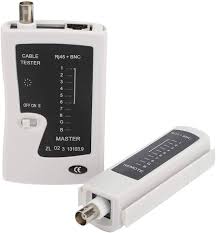A LAN BNC cable tester is a device used to test LAN (Local Area Network) cables that use BNC (Bayonet Neill-Concelman) connectors. BNC connectors are commonly used in older Ethernet networks, especially in coaxial cable-based networks.
Here's how a typical LAN BNC cable tester works:
1. **Connection Testing:** The tester checks for continuity in the cable and verifies that all conductors are properly connected. It ensures that there are no breaks or short circuits in the cable that could disrupt the network signal.
2. **Cable Length Measurement:** Some testers have the ability to measure the length of the cable. This feature is useful for determining the distance between network devices or identifying the location of cable faults.
3. **Signal Quality Testing:** The tester may also assess the quality of the network signal transmitted through the cable. It checks for issues such as signal loss, impedance mismatches, or interference that could degrade network performance.
4. **Visual and Audible Indicators:** Most cable testers provide visual and audible indicators to alert users to any faults detected in the cable. This feedback helps users quickly identify and troubleshoot problems.
5. **Portability:** LAN BNC cable testers are typically portable and easy to use in various network environments. They are designed for field use by network technicians, installers, and maintenance personnel.
6. **Compatibility:** These testers are specifically designed to work with LAN cables using BNC connectors. They may support different types of coaxial cables, such as RG-58 or RG-59, commonly used in Ethernet networks.
Overall, a LAN BNC cable tester is a valuable tool for ensuring the proper installation and maintenance of BNC-connected LAN cables, helping to optimize network performance and reliability.
